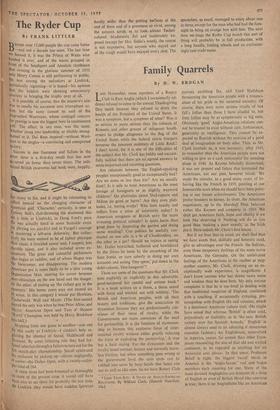The Ryder Cup
By FRANK LITTLER
BEFORE over 15,000 people the cup came home —and not a 'decade too soon. The last time WC housed it, it was the 'Prince of Wales who handed it over, and of the teams grouped in front of the SouthpOrt and Ainsdale clubhOuse that evening in the glorious summer of 1933 °oIY Henry Cotton is still performing in public. lie was among the onlookers at Lindrick, Patriotically regretting—it is hoped—his opinion that the holders were showing unnecessary courtesy in bringing the trophy over at all.
It is possible, of course, that the maestro's aim Was to needle his successor into triumphant ac- tion, but the same Cannot be said of the disgruntled Weetinans, whose conjugal concern for prestige is noWthe biggest bore in tournament &olf. The effect, in any case, was the same. Whether stung into leadership, or dbubly Streng- thened in it, Da i Rees inspired—without Weet- man in the singles—a convincing and unexpected victory.
Success in one foursome and failure in •the Other three is a first-day result that has now occurred no fewer than seven times. The indi- vidual British recoveries last week were, happily,
too many to list, and it might be interesting to reflect instead on the changing character of American golf. `Character,' certainly, is seen in Tommy Bolt's club-throwing (he shortened this act a little at Lindrick), in Doug Ford's pace ,(he was actually fined in some Stateside event 'or playing too quickly) and in Furgol's courage in mastering a left-arm deformity. But collec- tively the team seemed to be of lighter physique than usual,- it revealed newer and, I suspect, less durable talent, and it also included seven ex- amateurs. The great and colourful performers Who began as caddies, and of whom Hagen was the forerunner, are disappearing. The modern American pro is more likely to be a slim young Organisation Man, steering his career between over-relaxation on the one hand and the danger, on the other, of ending up `the richest guy in the cemetery.' His boom years may not exceed six O r seven. In this categork I would put Hawkins, Finsterwald, Wall and Mayer. (The first-named scored the only win when he beat Peter Alliss, and Mayer, American Open and Tam o' Shanter 'World' Champion, was held by Harry Bradshaw to.a half.)
Skipping from one game to another—you can do this easily at Lindrick-1 couldn't help re- gretting the absence of Snead, Middlecoff and
em a re t. By some irritating rule they had for- feited selection through a failure to turn out for the US match-play championship. Snead celebrated his exclusion by picking up—almost negligently, It seems—the Dallas Open, with a twenty-under- Par total of 264.
If these three had been trounced as thoroughly 1,t_s most of the present crop, it would still have been nice to see them for probably the last time. At Lindrick they would have trodden fairways hardly wider than the putting surfaces at the end of them and of a greenness so vivid, among the autumn scrub, as. to -look..almost Tachnf- colored. Moderately flal and -moderately ex- posed (except for Mrs. Sidda's wood), the course is not impressive, but anyone who stayed out of the rough would have enjoyed every shot. The
spectators, as usual, managed to enjoy about one in three, except for the man who had had the fore- sight to bring an orange box with .him. The next time we stage the Ryder Cup match this sort of thing will probably be in full production, with a long handle, folding wheels and an excruciat- ingly cute trade name.


































 Previous page
Previous page